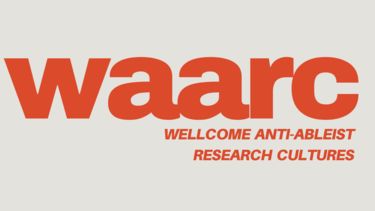Project updates
Find out more about how our Priority Areas and Cross-cutting themes are progressing

We will be using this page to offer regular updates on the progress of WAARC alongside refreshing our Anti-Ableist resources and Emerging Headlines
January 2026
- Dreaming up a Disability Inclusive Workplace webinar - 28th January, 12-1.30 p.m. held a session facilitated by Deepa Shastri on how to hold our organisations accountable when it comes to disability access towards staff. Our next webinar 'Self Advocacy at Work & Navigating Uncertainty' is on Wednesday 25th February - find out more and book at our events page
- Here's a link to our 'Cripping Research Culture' podcast - another episode went live in January! You can listen to it on Spotify or wherever you listen to your podcasts.
- Our four funded Collaborative Projects met together again and shared exciting news about how the projects are going.
December 2025
- WAARC and Humanising Healthcare hosted 'Humanising the System' event on 3rd December 2025 to launch the Humanising Healthcare Manifesto.
November 2025
- Our four funded Collaborative Projects met together and shared exciting news about their projects.
- Armineh (with Liz) presented a Lightning talk on 19 November 2025 - ESRC research project symposium: Amplifying the mental health of Black university students: A Black, Mad and Disability Studies intersectional inquiry.
October 2025
- Dan Goodley and Rebecca Lawthom were interviewed by colleagues in the White Rose University Consortium about the WAARC project which appeared today (1st October) on the consortium's website
- We held an internal 'Cripping the Concordat' exciting gameshow style event with postgraduate and early career researchers.
- Our 'Dreaming up a Disability Inclusive Workplace' webinar series began on 29th October. Topics were chosen by surveying members of the National Association of Disabled Staff Networks (NADSN) and we've curated workshops and talks from disabled professionals from a variety of backgrounds and industries. More webinars are coming in 2026!
- Here's a link to our 'Cripping Research Culture' podcast - which started streaming in October! You can listen to it on Spotify or wherever you listen to your podcasts.
September 2025
We are delighted to be joined by Nikita Hayden who will be working with Lauren White on the Developments priority area of WAARC and Elinor Noble who joins as our new Project Coordinator working alongside Liz Dew and the WAARC team.
July 2025
As we entered the second and final year of WAARC we reflected on some of the progress of our specific priority areas and cross-cutting themes below:
Priority Area 3
Collaboration
Sophie Phillips
We have now funded four Collaborative Projects - you can find more details of these projects here. Sophie Phillips has also presented to the University of Sheffield's Early Career Researcher Committee to share some of the objectives and emergent headlines from WAARC as well as to garner opinions from Early Career Researchers on the challenges and support they experience.

iHuman
How we understand being ‘human’ differs between disciplines and has changed radically over time. We are living in an age marked by rapid growth in knowledge about the human body and brain, and new technologies with the potential to change them.
